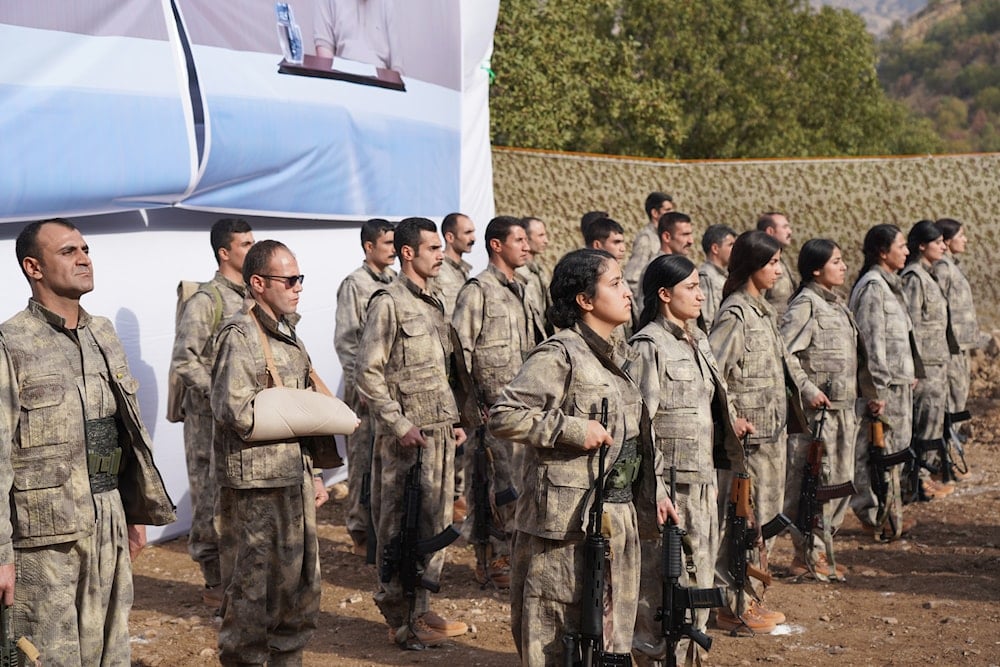Turkey drafts PKK reintegration Law as peace process advances
Turkey is drafting a law to allow PKK fighters and civilians to return from Iraq, excluding amnesty and relocating senior leaders to third countries.
-

Kurdistan Workers' Party (PKK) fighters, who reportedly withdrew from Turkey with their weapons, stand to attention during a ceremony in the Qandil area of northern, Iraq, Sunday, Oct 26, 2025 (AP)
Turkey is working on a new law that would allow many PKK fighters and civilians to come back to the country from their hideouts in northern Iraq under negotiations to end decades of war.
A senior Middle East official and a Kurdish political party source in Turkey told Reuters that the proposed law would protect returning individuals; however, it would not provide a general amnesty for crimes committed by former militants, and some militant leaders could be sent to third countries.
Bringing PKK guerrillas and their families home from their bases in mountainous northern Iraq is considered one of the final hurdles in a peace process, a process that began a year ago to end a war that has killed 40,000 people.
Although officials have only made broad public statements about reconciliation efforts, sources revealed previously undisclosed details, outlining proposals for staggered returns that would see civilians and fighters repatriated in separate phases, while commanders would be transferred to third countries without specifying when or how the process would unfold.
The Middle East official, speaking to Reuters on condition of anonymity due to the sensitivity of the talks, indicated that legislation enabling the returns could be introduced to the Turkish parliament as early as this month, without confirming any final timeline or outcome.
Returns to happen in waves
Numan Kurtulmus, who leads the reconciliation commission established by Türkiye in August, stated last week that legal measures would only be taken once Türkiye confirms that the PKK’s dissolution process has been fully completed, without specifying how or when such verification would occur.
The senior Middle East official said the current proposal envisions the return of around 1,000 civilians and non-combatants in the initial phase, to be followed by approximately 8,000 fighters once individual screenings have been carried out without disclosing further details on the criteria or timeline.
The official added that Türkiye has thus far declined to readmit roughly 1,000 senior and mid-level PKK members, instead seeking their relocation to a third country, potentially somewhere in Europe, without clarifying which states might be involved. Discussions on the matter were still underway, the official said, noting that some participants in the negotiations expressed concern that leaving out senior PKK leaders from the repatriation process could risk reigniting an insurgency without indicating how those concerns might be addressed.
The official added that a bill allowing the returns could be presented to the Turkish parliament by the end of November, without confirming whether it would be approved or debated immediately.
Tayip Temel, deputy co-chair of the pro-Kurdish DEM Party, which, despite being in opposition, has cooperated closely with the government on the peace process, said the current negotiations were centered around a framework personally underscored by Ocalan without elaborating on its specific terms or implications.
"Work is underway on a special law for the PKK to enable the democratic and social reintegration of its members," he told Reuters, adding that "The law will cover everyone returning from the PKK, whether civilian or militant. There is no plan for a phased return. The formula being worked on is comprehensive and applies to all."
He acknowledged that Türkiye had proposed relocating certain PKK members to third countries, but noted that such a plan would require consultations with the prospective host nations before any decisions could be finalized.
Different groups, different procedures
Another source from the DEM Party, the third-largest in parliament, said the commission preparing the proposal was developing a standalone law tailored specifically to the PKK that would steer clear of using the terminology associated with a general amnesty.
After the parliamentary commission finalizes its work, it is expected to submit the proposed PKK-specific law to parliament, setting the stage for possible legislative action without indicating when the process might move forward.
Hugh Williamson, Europe and Central Asia director at Human Rights Watch, said the commission holds a rare chance to influence the creation of a post-conflict society and should put forward ambitious recommendations to abolish repressive laws that have been used to silence and marginalize communities without specifying which laws should be prioritized.

 4 Min Read
4 Min Read










